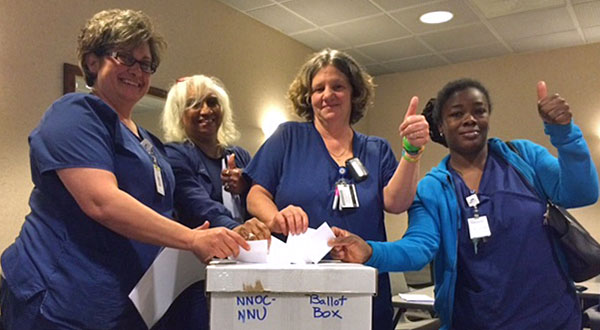Press Release
Registered Nurses at SSM-Saint Louis University Hospital Vote Overwhelmingly to Approve New Contract

Includes Significant Gains that Will Improve Patient Care
Registered nurses at SSM-Saint Louis University Hospital in St. Louis, Mo voted overwhelmingly to approve a new contract covering 660 RNs.
“Nurses voted for this new contract because it will improve staffing and patient care at SLUH,” said Marchelle Bettis Vernell, RN. “There are solid increases in educational and retirement benefits that we believe will both attract and retain nurses and lead to better staffing overall.”
“Nurses are pleased with this agreement and with the problem-solving attitude that the SSM negotiating team brought to the table. We hope this contract is a solid step forward in our having a cooperative relationship with SSM,” said Barbara Lowes, RN.
“The new staffing language in the contract commits SLUH to making every effort to staff safely. Having adequate staffing allows RNs at SLUH to provide the best patient care possible,” said Paul Holland, RN.
The RNs, affiliated with the National Nurses Organizing Committee/National Nurses United (NNOC/NNU), say the contract includes significant improvements and workplace protections that will enhance their ability to provide quality patient care. This is the first pact nurses have negotiated with SSM-Saint Louis University's new owner, SSM Health, a Catholic chain that operates in Wisconsin, Illinois, Oklahoma and Missouri. Nurses also affiliated with NNOC/NNU at Des Peres Hospital, part of Tenet Health, are currently in negotiations.
Key features in the contract include staffing improvements to promote patient safety, economic improvements to promote retention of experienced RNs and recruitment of new nurses, and critical health and safety training in safe patient handling, infection prevention and violence de-escalation and prevention.
Highlights of the contract include:
- Safe staffing improvements including: charge nurses will not take a patient assignment assuring they are available to provide assistance and resources when needed, and a requirement that RNs receive eight hours of rest after working a call shift before returning to work. This allows exhausted nurses to rest rather than provide patient care when too fatigued to do so safely.
- Stepped up health and safety provisions including training in safe-patient handling, infection prevention and de-escalation and prevention of workplace violence.
- Economic gains to help with nurse recruitment and retention that include raises that average 12 percent and range up to 26 percent over the term of the three-year contract and achievement of a wage scale that rewards RN years of experience.
- Improved retirement plan benefit.
- Maintenance of all health insurance benefit plans, without reduction in coverage or greater cost to employees.
- Improved ability for nurses to advocate for their patients and themselves, including a strengthened grievance procedure for disputes.